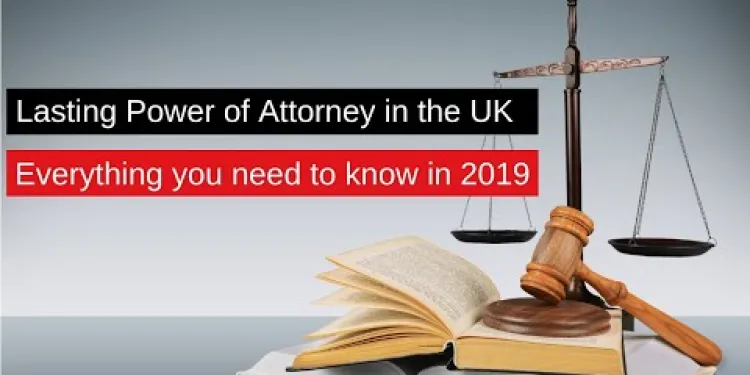Find Help
More Items From Ergsy search
-

What is a Lasting Power of Attorney?
Relevance: 100%
-

What is a lasting Power of Attorney?
Relevance: 98%
-

Lasting Power of Attorney UK - A 2023 Guide
Relevance: 94%
-

How to Set Up a Lasting Power of Attorney
Relevance: 92%
-

What is a Power of Attorney?
Relevance: 90%
-

What Is A Power of Attorney
Relevance: 88%
-

Can the Attorney General override a court decision?
Relevance: 50%
-

Can the Attorney General in the UK intervene in legal proceedings?
Relevance: 47%
-

Can the Attorney General of the UK make decisions on public prosecution matters?
Relevance: 45%
-

Is the position of Attorney General unique to the UK?
Relevance: 44%
-

What is the role of the Attorney General in the UK?
Relevance: 43%
-

What is the Attorney General in the UK?
Relevance: 43%
-

What is the Attorney General’s Office?
Relevance: 42%
-

Can the Attorney General be involved in judicial reviews?
Relevance: 42%
-

How does the Attorney General relate to the judiciary?
Relevance: 41%
-

Does the Attorney General in the UK handle prosecution cases?
Relevance: 41%
-

How is the Attorney General involved in the legislative process in the UK?
Relevance: 41%
-

What are the types of LPA?
Relevance: 40%
-

Does the Attorney General in the UK have to be a lawyer?
Relevance: 40%
-

What is the historical significance of the Attorney General's role in the UK?
Relevance: 39%
-

Is the Attorney General in the UK a member of the cabinet?
Relevance: 39%
-

Is the Attorney General part of the UK government?
Relevance: 39%
-

Who appoints the Attorney General in the UK?
Relevance: 39%
-

What is the difference between the Attorney General and the Solicitor General in the UK?
Relevance: 38%
-

Court of Protection
Relevance: 37%
-

Is the Attorney General involved in human rights issues?
Relevance: 37%
-

How long does the Attorney General serve in the UK?
Relevance: 36%
-

Does the Attorney General have a role in international law?
Relevance: 35%
-

What influence does the Attorney General have over the legal profession?
Relevance: 34%
-

What legal resources are available for carers of Alzheimer's patients?
Relevance: 30%
-

Can my attorney check my immigration status for me?
Relevance: 28%
-

How long do hosepipe bans last?
Relevance: 28%
-

How long do the effects of ketamine last?
Relevance: 26%
-

How long does Botox last?
Relevance: 26%
-

How long do the effects of Botox last?
Relevance: 25%
-

How long does chickenpox last?
Relevance: 25%
-

How long do cold sores last?
Relevance: 25%
-

How long do Turkey Teeth last?
Relevance: 25%
-

Can I apply for the payment on behalf of someone else?
Relevance: 25%
-

How long do Chikungunya symptoms last?
Relevance: 25%
What is a Lasting Power of Attorney?
A Lasting Power of Attorney (LPA) is a legal document in the United Kingdom that allows an individual to appoint someone else to make decisions on their behalf if they are no longer able to do so themselves. This can provide peace of mind, knowing that a trusted person will manage their affairs when they are not in a position to make decisions independently.
Types of Lasting Power of Attorney
There are two main types of LPAs in the UK:
- Health and Welfare LPA: This type of LPA allows the appointed attorney to make decisions regarding the individual's healthcare and personal welfare. This may include decisions about medical treatment, living arrangements, and daily care. This LPA can only be used when the individual lacks the mental capacity to make decisions themselves.
- Property and Financial Affairs LPA: This LPA enables the appointed attorney to manage the individual's financial matters. This can include paying bills, managing bank accounts, and buying or selling property. Unlike the Health and Welfare LPA, this LPA can be used even if the individual still has mental capacity, if they choose to permit it.
Setting Up a Lasting Power of Attorney
To set up an LPA in the UK, the individual must complete the relevant LPA forms and register them with the Office of the Public Guardian (OPG). The forms can be downloaded from the UK government website or completed online. The process involves the individual appointing one or more attorneys, having the form witnessed and signed by the person acting as the certificate provider (who confirms that the individual understands the LPA and is not being pressured into making it), and submitting the form to the OPG along with the registration fee.
The Role of the Attorney
An attorney appointed under an LPA has a duty to act in the best interests of the individual they are representing. They must follow the principles set out in the Mental Capacity Act 2005, which includes considering the individual's past and present wishes, encouraging their participation in decision-making as much as possible, and not taking advantage of the position for personal gain.
Revoking a Lasting Power of Attorney
An LPA can be revoked by the individual at any time, as long as they have the mental capacity to do so. This must be done in writing and the revocation must be registered with the OPG. An LPA will also be automatically revoked if the individual or the attorney dies, the attorney becomes bankrupt (for Property and Financial Affairs LPA), or the attorney loses mental capacity.
Having a Lasting Power of Attorney in place can provide reassurance that trusted individuals are legally recognised to make important decisions if one's own ability to do so becomes compromised.
What is a Lasting Power of Attorney?
A Lasting Power of Attorney (LPA) is a special paper in the United Kingdom. It lets someone choose another person to make decisions for them. This is useful if one day they cannot make decisions themselves. It helps make sure that someone they trust will take care of them and their things.
Types of Lasting Power of Attorney
There are two main types of LPAs in the UK:
- Health and Welfare LPA: This lets the chosen person decide about the individual's health and daily life. This can include choices about doctor's visits, where they live, and their daily care. This type is only used if the individual cannot make these decisions by themselves.
- Property and Financial Affairs LPA: This lets the chosen person manage the individual's money and property. They can pay bills, handle bank accounts, and even buy or sell houses. This type can be used even if the individual can still think for themselves, but they have to agree to it.
Setting Up a Lasting Power of Attorney
To get an LPA in the UK, the person must fill out LPA forms and send them to the Office of the Public Guardian (OPG). These forms can be downloaded from the UK government website or filled out online. The person needs to choose someone to be their attorney, get a witness to watch and sign the forms, and send the forms along with a fee to the OPG.
The Role of the Attorney
A person chosen as an attorney must help the individual they represent. They have to do what is best for the individual and think about what the individual wants. They should help the individual make choices as much as they can and should never use the position for themselves.
Revoking a Lasting Power of Attorney
A person can cancel an LPA if they can still make their own decisions. To do this, they must write it down and tell the OPG. An LPA also ends if the person or their attorney dies, the attorney cannot pay their debts (for Property and Financial Affairs LPA), or if the attorney cannot make decisions anymore.
Having a Lasting Power of Attorney can help make sure someone trusted can make important choices if the person cannot do it themselves.
Frequently Asked Questions
What is a Lasting Power of Attorney?
A Lasting Power of Attorney (LPA) is a legal document that lets you appoint one or more individuals to help you make decisions or to make decisions on your behalf if you lose the mental capacity to do so.
What are the types of LPA?
There are two types of LPA: Property and Financial Affairs LPA, and Health and Welfare LPA.
Who can make an LPA?
Anyone aged 18 or over with mental capacity can make an LPA.
Who can act as an attorney?
An attorney must be aged 18 or over, have mental capacity, and be someone you trust. They can be a relative, a friend, a professional, or your spouse or partner.
How do I register an LPA?
To register an LPA, you need to submit the completed forms to the Office of the Public Guardian (OPG) along with the registration fee.
When does a Property and Financial Affairs LPA come into effect?
A Property and Financial Affairs LPA can be used as soon as it is registered with the OPG, with your permission.
When does a Health and Welfare LPA come into effect?
A Health and Welfare LPA only comes into effect when you lose the mental capacity to make decisions.
Can I cancel an LPA?
Yes, you can cancel an LPA as long as you have the mental capacity to do so.
What if there are disputes about decisions made by the attorney?
Disputes can be resolved by the Court of Protection, which has the authority to make decisions regarding LPAs.
Do I need a solicitor to make an LPA?
You do not need a solicitor to make an LPA, but having legal advice can be beneficial to ensure that the document meets all legal requirements.
How much does it cost to register an LPA?
The registration fee for each LPA is £82. However, you might be eligible for a reduction or exemption based on your financial circumstances.
Can my attorneys make gifts on my behalf?
Attorneys can make limited gifts on your behalf, such as birthday or Christmas gifts to family members, if it is in your best interests and within certain guidelines.
What happens if my attorneys cannot agree on a decision?
If attorneys cannot agree and the LPA doesn't state how to resolve disputes, the matter may need to be referred to the Court of Protection.
Can an LPA be used outside the UK?
An LPA is primarily for use within the UK. You would need to check the legal requirements of the specific country for it to be recognised abroad.
What is the role of the Office of the Public Guardian?
The Office of the Public Guardian (OPG) registers LPAs and oversees the actions of attorneys to ensure they act in the best interests of the donor.
What is a Lasting Power of Attorney?
A Lasting Power of Attorney is a legal paper. It lets someone you trust help you make choices or make choices for you. This can be about your money or your health.
If it's hard to understand, you can ask someone to explain. Using pictures or a video can also help.
A Lasting Power of Attorney (LPA) is a paper you fill out. It lets you pick someone to help you with choices. If you can’t think clearly anymore, they can make choices for you.
What types of LPA are there?
When we talk about LPA, it means "Lasting Power of Attorney." This is a way for someone to help make decisions if you can't. There are two main types of LPA:
- Health and Care: This helps with choices about your health and how you live.
- Money and Property: This helps with choices about your money, like paying bills or selling your house.
If you need help, tools like voice to text can assist with writing. Talking things through with someone you trust can also be helpful. You can also ask someone to help explain things step by step.
There are two types of LPA. One type is called Property and Money LPA. The other type is called Health and Care LPA.
Who can make an LPA?
Anyone who is 18 or older can make an LPA. You should understand what an LPA is before you make one. If you need help understanding, ask someone you trust or use a tool like a simple video or a picture guide.
If you are 18 or older and can make decisions for yourself, you can make an LPA.
A tool that might help you understand more about LPA is a picture guide. It uses simple pictures and words to show how LPA works. If you like listening, you can ask someone to read this to you.
Who can be an attorney?
Some people can help you make choices about your life and your money. These people are called attorneys.
Do you want someone to help you? That person should be:
- A grown-up (18 years or older).
- Someone you trust a lot.
- Someone who understands what you want and will do what is best for you.
You can ask a family member or a good friend to be your attorney. They can help you make good decisions.
If you need more help, you can talk to your family, a teacher, or a social worker.
A person who helps you with legal things must be at least 18 years old. They need to understand what they are doing and be someone you trust. This person can be a family member, a friend, a professional, or your husband, wife, or partner.
How can I sign up for an LPA?
To sign up for an LPA, you need to fill out the forms. Then send them to the Office of the Public Guardian (OPG) with the money for registration.
When does a Property and Money LPA start working?
A Property and Money LPA is a form that lets someone help you with your money and things you own. It starts working when:
- You say it's okay for it to start right away, or
- You can't make money decisions for yourself anymore.
If you need help understanding how an LPA works, you can:
- Ask a friend or family member to explain it.
- Use pictures or drawings to see how it works.
- Watch a video about LPAs.
You can use a Property and Financial Affairs LPA after it is registered with the OPG, if you say it's okay.
When Does a Health and Welfare LPA Start Working?
A Health and Welfare LPA (Lasting Power of Attorney) is a choice you make. It lets someone help you make decisions about your care and medical treatment.
This help starts when you can’t make your own decisions anymore. This could be because you are too sick or have an accident.
Tools to help you understand:
- Ask someone you trust to explain it to you.
- Use pictures to help understand.
A Health and Welfare LPA starts working when you cannot make decisions by yourself anymore.
Can I stop an LPA?
Yes, you can stop an LPA if you can still make decisions for yourself.
What if people disagree with the attorney's decisions?
Sometimes, people might not agree with what the attorney decides. An attorney is someone who helps make choices for another person.
If there are disagreements, here are some things you can do:
- Talk about the problem to understand each other better.
- Ask a trusted friend or family member for help.
- Use a mediator to help everyone agree. A mediator is someone who helps people talk and solve problems.
If you still need help, you can contact a professional for advice. They can guide you on what to do next.
Problems can be solved by the Court of Protection. The Court can make decisions about Lasting Power of Attorney (LPA).
Do I need a lawyer to make an LPA?
An LPA is a special paper that lets you choose someone to help you make decisions if you can't. You might think you need a lawyer to help you make this paper, but you don't have to use one. You can do it by yourself if you want.
If you feel unsure, you can get help from a friend, family member, or a local advice center. Also, there are helpful guides and videos online that can show you what to do step by step.
Some people still choose to have a lawyer because they feel better having an expert check everything. It’s up to you!
You don't need a lawyer to make an LPA. But, a lawyer's help can make sure you do everything right.
How much money to register an LPA?
If you want to register an LPA (Lasting Power of Attorney), you need to pay some money. This is called a fee.
Here are some tips to help you:
- Ask a family member or a friend for help if you need it.
- You can use a calculator on a website to find out the cost.
- If you have questions, call someone who knows, like a lawyer.
The cost to sign up for each LPA is £82. But you might pay less or nothing if you don’t have a lot of money.
Can the people who help me with my money give gifts for me?
Lawyers can give small presents for you. These can be for birthdays or Christmas. They can only do this for family. They must think about what is best for you. They have to follow rules.
If you find reading hard, you can ask someone to read this to you. You can also use apps that read text out loud.
What if my attorneys can't make a decision together?
If your attorneys have trouble deciding, they might not agree. This can be difficult.
Here is how to help:
- They can talk to each other and listen carefully.
- They can ask someone they trust for advice.
- They can try to find a middle ground or a compromise.
- If they still can't agree, they can talk to a professional for help.
If attorneys can't agree and the LPA doesn't say what to do, the problem might need to go to the Court of Protection.
Can an LPA be used in other countries?
An LPA, or Lasting Power of Attorney, is a document that lets someone else make decisions for you. If you live in the UK and want to use an LPA in another country, you need to check if that country accepts it.
Here are some steps you can take:
- Ask a lawyer if the other country will accept your UK LPA.
- Some countries might need the LPA to be translated into their language.
- An apostille might be needed. This is a special stamp to show the document is real.
- Helpful tools: Look for easy-to-read guides or ask for help from someone you trust.
An LPA is mainly used in the UK. If you want to use it in another country, you need to find out what that country needs to accept it.
What Does the Office of the Public Guardian Do?
The Office of the Public Guardian helps people who may need support.
They make sure that people who can’t make decisions for themselves are safe.
If someone needs help with their money or health, the Office of the Public Guardian can help find the right person to make decisions for them.
Tools that can help understand more:
- Look at pictures or videos about the Office of the Public Guardian.
- Talk to a friend or helper about what the Office does.
The Office of the Public Guardian, or OPG, helps to keep an eye on people who take care of someone else's money or health decisions. These people are called attorneys. The OPG makes sure they do a good job and help the person who needs it.
Useful Links
This website offers general information and is not a substitute for professional advice.
Always seek guidance from qualified professionals.
If you have any medical concerns or need urgent help, contact a healthcare professional or emergency services immediately.
Some of this content was generated with AI assistance. We’ve done our best to keep it accurate, helpful, and human-friendly.
- Ergsy carfully checks the information in the videos we provide here.
- Videos shown by Youtube after a video has completed, have NOT been reviewed by ERGSY.
- To view, click the arrow in centre of video.
- Most of the videos you find here will have subtitles and/or closed captions available.
- You may need to turn these on, and choose your preferred language.
- Go to the video you'd like to watch.
- If closed captions (CC) are available, settings will be visible on the bottom right of the video player.
- To turn on Captions, click settings .
- To turn off Captions, click settings again.
More Items From Ergsy search
-

What is a Lasting Power of Attorney?
Relevance: 100%
-

What is a lasting Power of Attorney?
Relevance: 98%
-

Lasting Power of Attorney UK - A 2023 Guide
Relevance: 94%
-

How to Set Up a Lasting Power of Attorney
Relevance: 92%
-

What is a Power of Attorney?
Relevance: 90%
-

What Is A Power of Attorney
Relevance: 88%
-

Can the Attorney General override a court decision?
Relevance: 50%
-

Can the Attorney General in the UK intervene in legal proceedings?
Relevance: 47%
-

Can the Attorney General of the UK make decisions on public prosecution matters?
Relevance: 45%
-

Is the position of Attorney General unique to the UK?
Relevance: 44%
-

What is the role of the Attorney General in the UK?
Relevance: 43%
-

What is the Attorney General in the UK?
Relevance: 43%
-

What is the Attorney General’s Office?
Relevance: 42%
-

Can the Attorney General be involved in judicial reviews?
Relevance: 42%
-

How does the Attorney General relate to the judiciary?
Relevance: 41%
-

Does the Attorney General in the UK handle prosecution cases?
Relevance: 41%
-

How is the Attorney General involved in the legislative process in the UK?
Relevance: 41%
-

What are the types of LPA?
Relevance: 40%
-

Does the Attorney General in the UK have to be a lawyer?
Relevance: 40%
-

What is the historical significance of the Attorney General's role in the UK?
Relevance: 39%
-

Is the Attorney General in the UK a member of the cabinet?
Relevance: 39%
-

Is the Attorney General part of the UK government?
Relevance: 39%
-

Who appoints the Attorney General in the UK?
Relevance: 39%
-

What is the difference between the Attorney General and the Solicitor General in the UK?
Relevance: 38%
-

Court of Protection
Relevance: 37%
-

Is the Attorney General involved in human rights issues?
Relevance: 37%
-

How long does the Attorney General serve in the UK?
Relevance: 36%
-

Does the Attorney General have a role in international law?
Relevance: 35%
-

What influence does the Attorney General have over the legal profession?
Relevance: 34%
-

What legal resources are available for carers of Alzheimer's patients?
Relevance: 30%
-

Can my attorney check my immigration status for me?
Relevance: 28%
-

How long do hosepipe bans last?
Relevance: 28%
-

How long do the effects of ketamine last?
Relevance: 26%
-

How long does Botox last?
Relevance: 26%
-

How long do the effects of Botox last?
Relevance: 25%
-

How long does chickenpox last?
Relevance: 25%
-

How long do cold sores last?
Relevance: 25%
-

How long do Turkey Teeth last?
Relevance: 25%
-

Can I apply for the payment on behalf of someone else?
Relevance: 25%
-

How long do Chikungunya symptoms last?
Relevance: 25%


